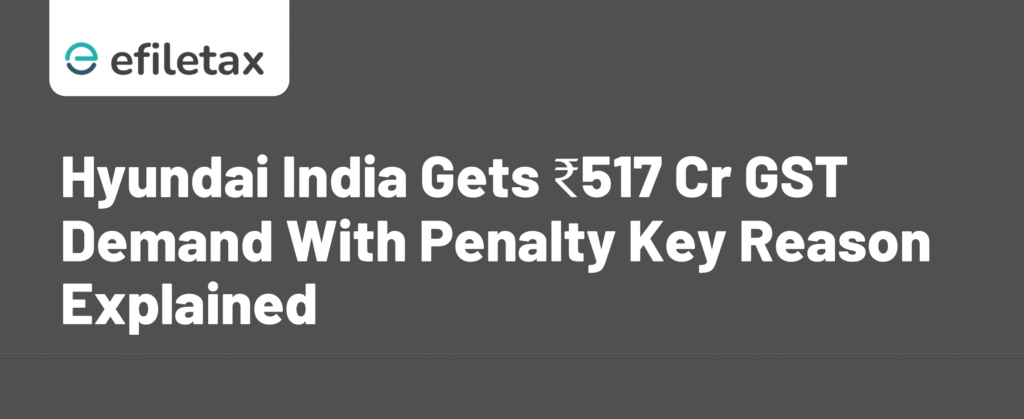
Why Hyundai India Got a ₹517.34 Cr GST Demand
A recent GST investigation led to a tax demand on Hyundai India totalling ₹517.34 crore, including interest and penalties. This case sheds light on how input tax credit (ITC) claims, dealer incentives, and advertisement costs are scrutinised by tax authorities under the CGST law.
Breakdown of the GST Demand Raised
As per Hyundai Motor India’s stock exchange filing:
| Particulars | Amount (₹ Cr) |
|---|---|
| GST Tax Demand | 308.07 |
| Interest and Penalty | 209.27 |
| Total Demand | 517.34 |
The order was issued by the Additional Commissioner, Chennai South GST Commissionerate, under Section 74 of the CGST Act, 2017 (fraud/wilful misstatement or suppression of facts).
What Triggered the Tax Notice?
Here are the main issues observed:
- Input Tax Credit Disallowed:
GST authorities questioned the ITC availed by Hyundai on certain expenditures, particularly promotional and advertising spends related to dealers. - Dealer Incentives and Schemes:
Tax officers argued that promotional schemes provided by Hyundai to its dealers were not directly related to supply, thus not eligible for ITC under Section 16 of the CGST Act. - Cross Charges on Services:
The department reportedly examined whether services rendered by Hyundai for the benefit of dealers were correctly valued and taxed under Schedule I (related party supplies).
Legal Angle: Section 74 vs Section 73
Hyundai’s case falls under Section 74 (invoked for cases involving fraud or suppression), not the milder Section 73 (used when no intent to evade tax is proven).
This makes it more serious and allows for 100% penalty on the tax amount if not contested or paid promptly.
Expert View: Not Just a Hyundai Issue
Industry Insight:
This case isn’t unique to Hyundai. Similar disputes have hit the auto and FMCG sectors.
Practical Tip:
Businesses must maintain strong documentation for ITC claims, especially for:
- Dealer incentive schemes
- Advertisement reimbursements
- Marketing spend allocations
Many firms unknowingly violate Rule 36(4) and Section 17(5) by availing ITC on blocked credits or ineligible expenses.
What Next for Hyundai?
Hyundai has stated it will appeal the order. Under the CGST law, the company must:
- File an appeal before the Appellate Authority within 3 months of the order (extendable by 1 month).
- Pre-deposit 10% of the disputed tax (₹30.80 Cr approx) as a condition for the appeal under Section 107(6).
Implications for Indian Businesses
The Hyundai case is a wake-up call:
- Promotional ITC is under lens: Clarify whether your ad spend benefits you or your dealers.
- Section 74 = Higher risk: Once fraud/suppression is alleged, penalty becomes mandatory.
- Contract structuring matters: Draft dealer agreements carefully, especially in co-branding arrangements.
Focus Keyphrase: Tax demand on Hyundai India
FAQs
Q1. Why did Hyundai get a GST notice?
Due to ITC claimed on advertising and dealer incentive schemes, which the department found ineligible.
Q2. Can Hyundai challenge the demand?
Yes, by filing an appeal under Section 107 with a 10% pre-deposit.
Q3. What is Section 74 under GST?
It applies when tax is unpaid due to fraud, suppression, or wilful misstatement, with harsher penalties.
Summary:
Hyundai India received a ₹517.34 crore GST demand citing ineligible ITC on dealer schemes and advertising spends. The case, raised under Section 74, highlights risks around ITC claims and dealer transactions under GST.